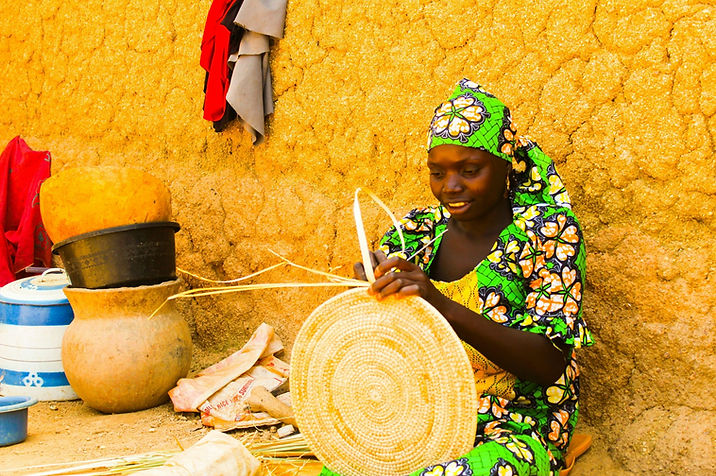
Kano, one of the largest cities in Nigeria, is a vibrant and bustling metropolis located in the northern part of the country. Known for its rich cultural heritage, historical significance, and thriving economy, Kano is a city that offers a unique blend of tradition and modernity.
With its ancient landmarks, colourful markets, and lively atmosphere, Kano is a destination that promises an unforgettable experience for every traveller.
A Brief History
Kano traces its origins to ancient settlements around Dalla Hill, with evidence of habitation dating back centuries. According to the Kano Chronicle, Bagauda became the first king of Kano in 999, establishing the Hausa state that grew into a powerful kingdom.
By the 11th century, Kano was fortified with city walls, marking its rise as a centre of governance and trade. The city flourished along trans‑Saharan trade routes, dealing in textiles, leather, and agricultural goods, and later became a hub for Islamic scholarship after the adoption of Islam in the 14th century.
During the colonial era, Kano was incorporated into British Nigeria, retaining its role as a major commercial centre. The railway connection in the early 20th century further boosted its economy, linking it to Lagos and other regions.
Today, Kano is one of Nigeria’s largest cities and a leading industrial hub in the north, known for its dye pits, bustling markets, and historic landmarks such as the Emir’s Palace and the ancient city walls.
For more, see Kano on Wikipedia.
Kano, Nigeria
Attractions and Activities
Kano City Walls and Gates
Dating back to the 11th century, the ancient city walls of Kano are among the most impressive in West Africa. The gates, once used to control trade and protect the city, remain iconic landmarks for history enthusiasts and photographers.
Emir’s Palace
The Emir’s Palace is a cultural and political centre, blending traditional Hausa architecture with historic significance. Visitors can admire its courtyards, ornate designs, and learn about the emirate system that continues to shape Kano’s identity.
Kurmi Market
Founded in the 15th century, Kurmi Market is one of Africa’s oldest trading hubs. It offers textiles, leather goods, spices, and crafts, making it a vibrant spot for shopping and cultural immersion.
Kofar Mata Dye Pits
These centuries‑old dye pits are still in use today, producing indigo‑dyed fabrics through traditional methods. The site is a living heritage of Kano’s textile industry and a fascinating stop for cultural tours.
Gidan Makama Museum
Housed in a former palace, the Gidan Makama Museum showcases artefacts, traditional crafts, and exhibits on Kano’s history. It’s an essential stop for understanding the city’s cultural evolution.
Dalla Hill
A historic site believed to be the earliest settlement in Kano, Dalla Hill offers panoramic views of the city. It is tied to legends and traditions, making it both a scenic and cultural landmark.
Kano Zoo
Located near the city centre, Kano Zoo is home to a variety of animals and serves as a family‑friendly attraction. It’s a popular spot for leisure and education.
Kano Central Mosque
One of the largest mosques in Nigeria, the Kano Central Mosque is a striking example of Islamic architecture. It remains a spiritual and cultural landmark, especially during Friday prayers and religious festivals.
Culture
Arts and Performance Spaces
Kano’s cultural scene is anchored by the Gidan Makama Museum, which showcases traditional crafts, historic artefacts, and Hausa heritage. The city also hosts vibrant performance spaces where theatre, storytelling, and traditional dance highlight northern Nigeria’s artistic traditions.
Live Music and Local Sound
Kano is known for Hausa music, blending traditional instruments like the kakaki trumpet and talking drums with modern styles. Contemporary Hausa pop, known as Kannywood music, thrives alongside Islamic praise songs and folk performances. Local venues and festivals keep the city’s soundscape lively and diverse.
Culinary Diversity
Kano’s food scene is rich and hearty, with staples like tuwo shinkafa (rice pudding), miyan kuka (baobab leaf soup), and suya (spiced grilled meat). Street vendors and markets serve fresh produce and snacks, while restaurants offer both traditional Hausa dishes and international cuisine.
Festivals and Cultural Events
Annual events such as the Durbar Festival showcase horse parades, drumming, and colourful regalia, celebrating Islamic holidays and the Emir’s leadership. Cultural fairs and Kannywood film premieres highlight Kano’s creative industries, blending tradition with contemporary entertainment.
Best Time to Visit
Kano is a year‑round destination, but the cooler dry season from November to March offers the most comfortable weather for sightseeing, cultural festivals, and market visits. Each season brings its own rhythm and flavour.
Spring (March to May)
Spring in Kano is hot and dry, with daytime temperatures rising steadily. It’s a good time to explore indoor attractions like the Gidan Makama Museum or shop at Kurmi Market in the mornings before the heat builds.
Summer (June to August)
Summer marks the rainy season, with short but heavy showers that refresh the city’s greenery. While outdoor activities may be affected, the cooler air makes visits to the Emir’s Palace and Kano Central Mosque more pleasant.
Autumn (September to October)
Autumn brings a mix of lingering rains and drier days. It’s ideal for cultural exploration, including the Kofar Mata Dye Pits and Dalla Hill. The Durbar Festival, held during Islamic holidays, showcases horse parades, drumming, and colourful regalia.
Winter (November to February)
Winter is peak travel season in Kano, with cooler temperatures and clear skies. It’s perfect for sightseeing at the ancient city walls, enjoying outdoor markets, and attending religious and cultural events. The comfortable climate makes this the best time for photography and walking tours.
Suggested Itinerary
Day 1
Morning: Begin at the ancient Kano City Walls and Gates, exploring their historic significance and architecture. Walk through the Emir’s Palace to admire traditional Hausa design and learn about the emirate system.
Afternoon: Visit the Gidan Makama Museum, housed in a former palace, to see artefacts and exhibits on Kano’s cultural evolution.
Evening: Dine near Kurmi Market, sampling local dishes like suya and tuwo shinkafa at traditional restaurants.
Day 2
Morning: Explore the Kofar Mata Dye Pits, where artisans still practise centuries‑old indigo dyeing techniques.
Afternoon: Head to Dalla Hill for panoramic views of the city and insight into Kano’s earliest settlement legends.
Evening: Experience live Hausa music or Kannywood film screenings, immersing yourself in Kano’s vibrant cultural scene.
Day 3
Morning: Shop at Kurmi Market, one of Africa’s oldest trading hubs, for textiles, leather goods, and crafts.
Afternoon: Visit the Kano Central Mosque, a striking landmark of Islamic architecture and spiritual life.
Evening: Wrap up your trip with dinner at a local restaurant, enjoying miyan kuka or other Hausa specialities, and reflect on Kano’s blend of tradition and modernity.

Local Tips
Start Early
Kano’s heat builds quickly, especially from midday onward. Begin your day with visits to markets, museums, or historic sites before peak temperatures and traffic set in.
Stay Hydrated
The hot, dry climate can be draining. Carry bottled water when exploring outdoor sites like Dalla Hill or the city walls. Fresh fruit juices and local drinks are widely available and refreshing.
Mind the Heat
Kano’s combination of sun and dry air can affect energy levels. Take breaks in shaded areas or air‑conditioned cafés during the afternoon to stay comfortable.
Stay Cool, Stay Modest
Light, breathable clothing is ideal during the day, but a scarf or wrap is useful for cooler evenings or indoor venues. Modest dress is appreciated at cultural and religious sites such as the Emir’s Palace and Kano Central Mosque.
Respect Cultural Sites
Places like the Emir’s Palace, Kurmi Market, and the Kofar Mata Dye Pits hold deep cultural significance. Follow posted guidelines, ask before taking photos, and be mindful of local customs.
Try Local Dishes
Kano’s cuisine is hearty and flavourful. Try tuwo shinkafa (rice pudding), miyan kuka (baobab leaf soup), and suya (spiced grilled meat). Ask about spice levels, as some dishes can be rich and filling.
Use Local Markets
Markets such as Kurmi Market are great for textiles, leather goods, and handmade crafts. Bargaining is common, and shopping directly from artisans supports local livelihoods.
Tipping Is Appreciated
Tipping isn’t mandatory but is welcomed in restaurants, taxis, and for guided tours. 10–15% is considered generous and helps support service workers.
Plan for Sun
The sun in Kano can be intense year‑round. Sunglasses, sunscreen, and a hat are essential, especially when visiting open‑air markets or walking tours.
Ask Locals
Kano residents are welcoming and proud of their city. Don’t hesitate to ask for directions, food recommendations, or tips on where to catch live music or cultural events.
Travel Tips
Emergency Services
In case of emergency, dial 199 for police, 112 for ambulance, or 118 for fire services. Response times can vary, so it’s helpful to know the location of nearby clinics or hospitals such as Aminu Kano Teaching Hospital and Murtala Muhammad Specialist Hospital, both commonly used by travellers.
Nearest Train Station
Kano Railway Station is located near the city centre and serves as a major hub in northern Nigeria. It connects to Lagos and other regions via the Nigerian Railway Corporation, though services can be limited. Most intercity travel is handled by buses, shared taxis, and private cars.
Nearest Airport
Mallam Aminu Kano International Airport (KAN) is Kano’s main airport, located about 12 km from the city centre. It offers domestic and international flights, with access to taxis, shuttle services, and car rentals. The airport is traveller‑friendly, with lounges, currency exchange, and SIM card kiosks available on arrival.
Commonly Asked Questions
Q: What is the best time of year to visit Kano?
A: The cooler dry season from November to March offers the most comfortable weather for sightseeing and festivals.
Q: What are must‑visit attractions in Kano?
A: Highlights include the ancient city walls and gates, Emir’s Palace, Kurmi Market, Kofar Mata Dye Pits, Gidan Makama Museum, and Dalla Hill.
Q: Is Kano family‑friendly?
A: Yes — Kano offers family‑friendly experiences like visits to the zoo, picnics at Dalla Hill, and cultural tours of the museum and dye pits. Markets and food stalls also provide lively open‑air experiences.
Q: What are the best outdoor activities in Kano?
A: Popular activities include exploring the city walls, hiking Dalla Hill, shopping at Kurmi Market, and attending the colourful Durbar Festival.
Q: How can I get around Kano?
A: Transport options include taxis, minibuses known as keke or danfo, and private car rentals. Walking is convenient in central areas, while buses and trains connect to regional destinations. Mallam Aminu Kano International Airport provides domestic and international links.
Kano, with its captivating blend of history, culture, and natural beauty, offers an unforgettable travel experience. From its vibrant markets to its rich cultural heritage, there's something for every traveller. So pack your bags and get ready to explore the enchanting city of Kano, Nigeria!
Happy travels! 🌍✈️












